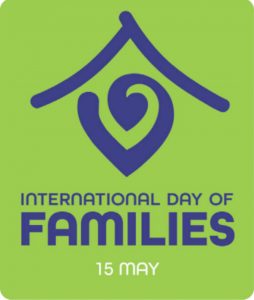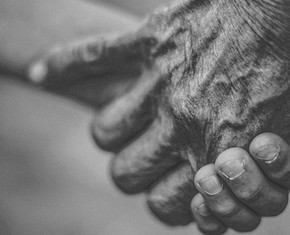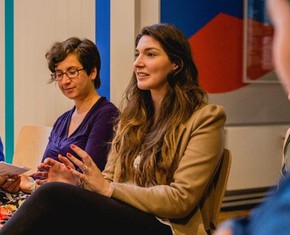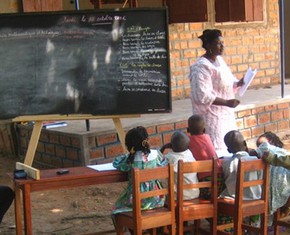The views expressed in our content reflect individual perspectives and do not represent the authoritative views of the Baha'i Faith.
Parents, what’s your biggest child-rearing responsibility?
Many people would say that their main parental responsibilities include making sure their children are fed, clothed and properly housed. Some would say they owe their children a good, morally-sound upbringing. Others might emphasize their children’s physical health or their athletic abilities.
This year, though, the United Nations theme for the celebration of the International Day of Families (IDF) focuses on the role of families and family-oriented policies in promoting the education and overall well-being of children. In particular, the IDF’s 2017 theme raises awareness of the role of families in promoting early childhood education and lifelong learning opportunities for children and youth. You can learn more about the IDF here.
 The International Day of Families highlights the importance of parental education for the welfare of children, and on good practices for work-family balance to assist parents in their educational and caregiving roles. The Day also aligns with the UN’s Sustainable Development Goals, which aim “to discuss the importance of knowledge and skills needed to promote sustainable development, including among others, through education for sustainable development and sustainable lifestyles, human rights, gender equality, promotion of a culture of peace and non-violence, global citizenship and appreciation of cultural diversity and of culture’s contribution to sustainable development.”
The International Day of Families highlights the importance of parental education for the welfare of children, and on good practices for work-family balance to assist parents in their educational and caregiving roles. The Day also aligns with the UN’s Sustainable Development Goals, which aim “to discuss the importance of knowledge and skills needed to promote sustainable development, including among others, through education for sustainable development and sustainable lifestyles, human rights, gender equality, promotion of a culture of peace and non-violence, global citizenship and appreciation of cultural diversity and of culture’s contribution to sustainable development.”
That critically important theme—the universal, sustainable education of all children—resonates deeply throughout the Baha’i teachings:
Education holds an important place in the new order of things. The education of each child is compulsory. If there is not money enough in a family to educate both the girl and the boy the money must be dedicated to the girl’s education, for she is the potential mother. If there are no parents the community must educate the child. In addition to this widespread education each child must be taught a profession, art, or trade, so that every member of the community will be enabled to earn his own livelihood. Work done in the spirit of service is the highest form of worship. – Abdu’l-Baha, Divine Philosophy, p. 83.
As you can see, Baha’is believe in universal compulsory education for all children, regardless of their gender, their nationality or their culture.
If we educated every child in the world, can you imagine what a profound impact that would have on our global civilization, just in the span of one generation?
This responsibility is so important, the Baha’i teachings say, that it goes beyond parents and the immediate nuclear family, and extends to non-parents, the community and the entire world:
It is the duty of all to look after the children. Those without children should, if possible, make themselves responsible for the education of a child. – Abdu’l-Baha, Abdu’l-Baha in London, p. 90.
… it is incumbent upon the father and mother to train their children both in good conduct and the study of books; study, that is, to the degree required, so that no child, whether girl or boy, will remain illiterate. – Selections from the Writings of Abdu’l-Baha, p. 127.
All mankind should partake of both knowledge and education, and this partaking of knowledge and of education is one of the necessities of religion. The education of each child is obligatory. If there are no parents, the community must look after the child. – Abdu’l-Baha, Star of the West, Volume 6, p. 5.
These admonitions from the Baha’i teachings emphasize early-childhood education, but they also encourage everyone who educates a child to do so to the absolute best of their ability:
Give this child a good education; make every effort that it may have the best you can afford, so that it may be enabled to enjoy the advantage of this glorious age. – Abdu’l-Baha, Abdu’l-Baha in London, p. 111.
We only have, as the Baha’i teachings and the UN International Day of Families both point out, a limited window to nurture and teach our children:
Unless the child, in his earliest years, be carefully tended, whether in a material or a spiritual sense, whether as to his physical health or his education, it will prove extremely difficult to effect later on. For example, if a child is not properly cared for in the beginning of life, so that he doth not develop a sound body and his constitution doth not flourish as it ought, his body will remain feeble, and whatever is done afterward will take little effect. This matter of protecting the health of the child is essential, for sound health leadeth to insights and sense perceptions, and then the child, as he learneth sciences, arts, skills, and the civilities of life, will duly develop his powers… – from a previously untranslated Tablet by Abdu’l-Baha.
Experts agree that taking advantage of the crucial early childhood development period provides children with their best opportunity to grow into caring, well-educated adults. If you’re one of those adults, take a moment today to thank your own parents, and think about contributing to the raising of children whose parents can’t educate them, as Abdu’l-Baha counseled the American Baha’i Laura Clifford Barney after the passing of her own father:
… parents endure the greatest toil and trouble for their children, and often, by the time the latter have reached the age of maturity, the former have hastened to the world beyond. Rarely do the mother and father enjoy in this world the rewards of all the pain and trouble they have endured for their children. The children must therefore, in return for this pain and trouble, make charitable contributions and perform good works in their name, and implore pardon and forgiveness for their souls. You should therefore, in return for the love and kindness of your father, give to the poor in his name and, with the utmost lowliness and fervour, pray for God’s pardon and forgiveness and seek His infinite mercy. – Abdu’l-Baha, Some Answered Questions, newly revised edition, p. 267.
















Comments
Sign in or create an account
Continue with Googleor